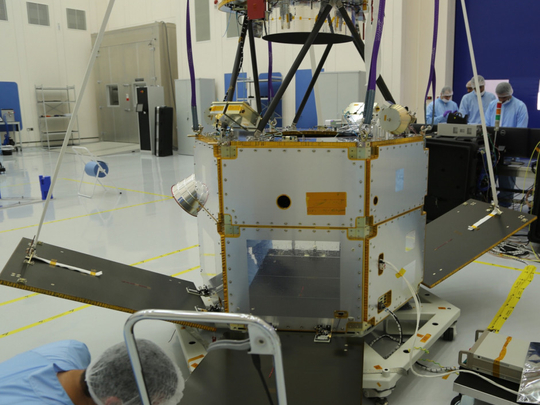
Dubai: KhalifaSat, the first Emirati satellite, will be launched on October 29 from Tanegashima Space Centre in Japan; Shaikh Hamdan Bin Mohammad Bin Rashid Al Maktoum, Crown Prince of Dubai and Chairman of Executive Council announced Wednesday on his twitter account.
KhalifaSat has been developed by a team of young Emiratis engineers at the Mohammad Bin Rashid Space Center. “Proud of the Mohammad Bin Rashid Space Center, where a team made up entirely of young Emirati engineers have developed the first Emirati satellite, Khalifa Sat,” Shaikh Hamdan tweeted.
The launch of Khalifa Sat coincides with the Year of Zayed.
“This important step would not have been possible without the great support by our wise leadership, which provides Emirati youth with all the tools needed to encourage them to become innovators and contribute to the drive of scientific advancement and human development,” Hamdan tweeted.
This is an important milestone for our country, an achievement made possible because our leadership supports Emirati youth and encourages them to excel in the fields of innovation and technological development. pic.twitter.com/GVlJs6Z9Ai
— Hamdan bin Mohammed (@HamdanMohammed) August 29, 2018
The Mohammed bin Rashid Space Centre is set to launch Khalifa Sat from the Tanigashima Space Center in Japan into space on October 29 this year. pic.twitter.com/Nt44lcDDOj
— Hamdan bin Mohammed (@HamdanMohammed) August 29, 2018
Proud of the Mohammed bin Rashid Space Center, where a team made up entirely of young Emirati engineers have developed the first Emirati satellite, Khalifa Sat. pic.twitter.com/uUTJtax4Pi
— Hamdan bin Mohammed (@HamdanMohammed) August 29, 2018
KhalifaSat is the first satellite developed in space technology laboratories in the UAE entirely by Emirati engineers. It is the third satellite owned by MBRSC following the launch of DubaiSat-1 and DubaiSat-2.
Once the manufacture and rigorous testing phases have been completed, the satellite will be transported to Japan for launch aboard the Mitsubishi Heavy Industries rocket – H-IIA.
When placed into a Low Earth Orbit of approximately 613km, the satellite will proceed to capture detailed imagery capable of competing with the highest industry standards.
The images beamed back to earth by KhalifaSat will be among the most detailed commercially available, with a GSD of 0.7m Panchromatic, and 2.98m GSD in four multispectral bands.
The KhalifaSat project, launched in 2013, is part of MBRSC’s long-term strategy to encourage innovation, stimulate technological progress, promote sustainable development and create a generation of Emirati scientists and engineers who will contribute to a scientific renaissance and lead ambitious space projects over the next decade.
Once in orbit, KhalifaSat will provide detailed high-quality imagery for a variety of uses, allowing the UAE to provide competitive services across the world.












